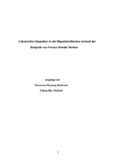Citation link:
https://nbn-resolving.org/urn:nbn:de:hbz:467-2363| DC Field | Value | Language |
|---|---|---|
| dc.contributor.author | Photong-Wollmann, Pimonmas | - |
| dc.date.accessioned | 2019-09-02T09:56:09Z | - |
| dc.date.available | 2006-08-10T12:12:12Z | - |
| dc.date.available | 2019-09-02T09:56:09Z | - |
| dc.date.issued | 1996 | - |
| dc.description.abstract | In der vorliegenden Arbeit geht es um die Frage, inwiefern die Migrantenliteraten ihre Literatur als wirksames Integrationsmedium einsetzen. Die Untersuchung soll versuchen, aufzuzeigen, wie verschiedene Integrationsphasen in der Migrationsliteratur unter bestimmten sozial-historischen Bedingungen in Deutschland entstanden sind. Untersucht werden vor allem die Integrationsprozesse in der Migrationsliteratur. Es gibt in der Arbeit verschiedene Fallstudien zu einzelnen Texten Franco Biondis, die in unterschiedlichen Phasen der Migration und der Migrationsliteratur geschrieben wurden (in der Zeit vom Anfang der 80er Jahre bis zum Anfang der 90er Jahre). Die drei an verschiedenen Zeitpunkten entstandenen Werke Biondis als Untersuchungsobjekte sollen –entsprechend dem sozial-historischen Hintergrund der Migrationsliteratur in Deutschland- die Entwicklungslinie des expliziten Integrationskonzepts des Autors aufzeigen. | de |
| dc.description.abstract | The “Migrationsliteratur”, German Literature written by immigrants, has become a part of the German literary life. This kind of literature gives us an opportunity to understand the circumstances and conditions of their living in this country. The “Migrationsliteratur” is, for the writing immigrants, a medium which represents their concepts of integration. The forms of integration found in the “Migrationsliteratur” are various. The first form concerns the social aspect, as the literature written by the immigrants can be understood as a medium, which emphasizes their social participation in the German society. The second form seen in the “Migrationsliteratur” shows us the experienced integration on the personal level as a long, difficult and mostly painful process. The word “integration” symbolizes a lost identity, alienation and generation conflicts within the migrant family. The last and the most important form of integration in the “Migrationsliteratur” concerns the literary aspect. This kind of writing shows us the cross-cultured literary acculturation as seen in the novels of the Italian writer Franco Biondi, who combines his native literary elements such as the influence of the famous Italian writers, Vittorini and Pirandello, and the German novel forms to create his owns. The novels of Biondi are therefore an outstanding example of integration in the “Migrationsliteratur”. | en |
| dc.identifier.uri | https://dspace.ub.uni-siegen.de/handle/ubsi/236 | - |
| dc.identifier.urn | urn:nbn:de:hbz:467-2363 | - |
| dc.language.iso | de | de |
| dc.rights.uri | https://dspace.ub.uni-siegen.de/static/license.txt | de |
| dc.subject.ddc | 830 Deutsche Literatur | de |
| dc.subject.other | literarische Integration | de |
| dc.subject.other | Migrantenliteratur | de |
| dc.subject.other | Gastarbeiterliteratur | de |
| dc.title | Literarische Integration in der Migrationsliteratur anhand der Beispiele von Franco Biondis Werken | de |
| dc.type | Doctoral Thesis | de |
| item.fulltext | With Fulltext | - |
| ubsi.date.accepted | 1997-05-19 | - |
| ubsi.publication.affiliation | Fachbereich 3, Sprach-, Literatur- und Medienwissenschaften | de |
| ubsi.subject.ghbs | CJH | - |
| ubsi.type.version | publishedVersion | de |
| Appears in Collections: | Hochschulschriften | |
Files in This Item:
| File | Description | Size | Format | |
|---|---|---|---|---|
| photong.pdf | 613.99 kB | Adobe PDF |  View/Open |
This item is protected by original copyright |
Page view(s)
1,224
checked on Apr 3, 2025
Download(s)
7,544
checked on Apr 3, 2025
Google ScholarTM
Check
Items in DSpace are protected by copyright, with all rights reserved, unless otherwise indicated.

